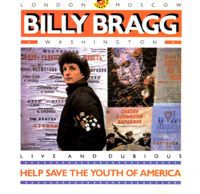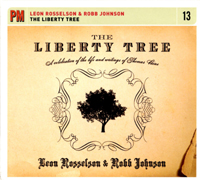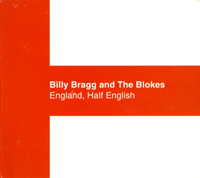Political song in Britain I – The state of affairs in 2014
17. 8. 2014 | Rubriky: Articles,Feature
 [By Ken Hunt, London] The Summer of 2013 saw the 30th Anniversary Edition of Billy Bragg’s Life’s A Riot With Spy Vs Spy. It counts as a landmark release in the history of British political song, even though its most enduring morsel in the wider popular consciousness is A New England – a song that Kirsty MacColl covered so well and took into the UK Top Ten in 1985. At the time of its release Margaret Thatcher was at the helm of her ship but hell-bent on stormy weather ahead. In 1984 the seismic Miners’ Strike would forever reshape Britain’s political contours.
[By Ken Hunt, London] The Summer of 2013 saw the 30th Anniversary Edition of Billy Bragg’s Life’s A Riot With Spy Vs Spy. It counts as a landmark release in the history of British political song, even though its most enduring morsel in the wider popular consciousness is A New England – a song that Kirsty MacColl covered so well and took into the UK Top Ten in 1985. At the time of its release Margaret Thatcher was at the helm of her ship but hell-bent on stormy weather ahead. In 1984 the seismic Miners’ Strike would forever reshape Britain’s political contours.
Less prominent in the brouhaha following her death on 8 April 2013 was Chumbawamba’s In Memoriam: Margaret Thatcher – a limited edition EP release celebrating good riddance to the Iron Lady sent out to subscribers the next day. Many had paid their money long ago and had for waited years. Bragg’s measured and thoughtful Facebook posting recognised infirmity. Like an echo of I Dreamed I Saw Joe Hill Last Night, it read “Don’t celebrate – organise!”
Political song in Britain is in rude health. Part of its healthy state derives from its performers and song-makers looking both backwards and forwards. Its deliverers span the generations. Epitomising that principle is the Anti-Capitalist Roadshow and its souvenir, the double CD Celebrating Subversion (2012). Fielding Frankie Armstrong, Roy Bailey, Robb Johnson, Reem Kelani, Grace Petrie, Peggy Seeger and others, it describes itself as “a collective of singers and songwriters, plus one magician” – the last-mentioned being “socialist magician” Ian Saville.
 Grassroots in nature and orientation, the country’s network of folk clubs is still the bread-and-butter provider for a good share of people’s livelihoods. In general terms, the folk scene accommodates the overlapping folk revival, acoustic music and political song factions pretty neatly. The same club will book guests of any of those persuasions. Nevertheless, there often seems to be a sort of glass door between the various factions. Perhaps as a by-product of this, a scattering of alternative, parallel venues has sprung up. These cater to “the underground of the underground”, as R2‘s editor Sean McGhee calls it. Some have strong folk-punk or punk-rock leanings but the principle is to provide platforms. That works for established performers such as Attila the Stockbroker or the next wave such as Louise Distras.
Grassroots in nature and orientation, the country’s network of folk clubs is still the bread-and-butter provider for a good share of people’s livelihoods. In general terms, the folk scene accommodates the overlapping folk revival, acoustic music and political song factions pretty neatly. The same club will book guests of any of those persuasions. Nevertheless, there often seems to be a sort of glass door between the various factions. Perhaps as a by-product of this, a scattering of alternative, parallel venues has sprung up. These cater to “the underground of the underground”, as R2‘s editor Sean McGhee calls it. Some have strong folk-punk or punk-rock leanings but the principle is to provide platforms. That works for established performers such as Attila the Stockbroker or the next wave such as Louise Distras.
The folk club scene acting as a hotbed for politically inspired songwriters is nothing new. Once upon
a time, as far as most people on the British folk scene were concerned – and it was the widely held consensus view – the whole damned folk scene was leftie, liberal or worse. It was a fallacy but never a complete fallacy. The plain fact was that, in terms of voting habits, the colours nailed to the folk scene’s mast were multicoloured. That freedom encouraged, say, the Tory-voting songwriter (and naval historian) Cyril Tawney to write exquisite songs of social observation.
Britain’s unique folk club scene truly bred, or acting as midwife to, political and topical song-making. When Pete Seeger visited in the 1950s he encountered a folk scene that astounded him. One message he took back home concerned a song movement of hugest vigour and punch. Typically, Johnny Handle, Stan Kelly and Leon Rosselson spearheaded this revelation. While certain writers were operating under the influence of Francophone chanson, others used dialect,
occupation or regionality to channel social commentary.
“These Americans came over,” remembers Rosselson, “and heard me perform, and other people, at some event and I remember how impressed they were by the fact that there were these topical, as they would call them, songs being written over here. There was no equivalent over there. This is way before ‘Protest’ started. All that flow from Woody Guthrie had stopped. People weren’t writing songs anymore. The songwriting revival happened here before it happened in America.”
 Into this songwriting melting-pot came other inspirations. Chartism – a British working-class movement for political reform – was one. Another major one was what was the satirical movement, a movement given national prominence through That Was The Week That Was, the two short-lived BBC series televised in 1962 and 1963. Again looking backwards and forwards, Rosselson and Johnson’s The Liberty Tree (2010) takes as its inspiration that “atheistic and traitorous scoundrel” Tom Paine, the author of Rights of Man (1791) and The Age of Reason (1793-94) and the man who fed ideas into the French and American Revolutions.
Into this songwriting melting-pot came other inspirations. Chartism – a British working-class movement for political reform – was one. Another major one was what was the satirical movement, a movement given national prominence through That Was The Week That Was, the two short-lived BBC series televised in 1962 and 1963. Again looking backwards and forwards, Rosselson and Johnson’s The Liberty Tree (2010) takes as its inspiration that “atheistic and traitorous scoundrel” Tom Paine, the author of Rights of Man (1791) and The Age of Reason (1793-94) and the man who fed ideas into the French and American Revolutions.
Between May 1979 and November 1990, Thatcher and her Tory administration were in power. It made her both an emblematic and popular figure for vilification, one by-product of which was her achieving a kind of reverse Muse status for political songwriters. She inspired the opposition. After all, oppression can do wonders and make writers more resourceful. The Scottish Trades Union Congress famously underwrote Dick Gaughan’s 1986 album of songs about miners and mining, True and Bold as part of an awareness-raising drive.
The trades union movement, once so active from the 1960s through to the 1980s, is now largely off the arts radar, though in a neat twist, in October 2013 the ever-prolific and teaching professional, Robb Johnson put together a limited edition release to support the Brighton & Hove National Union of Teachers’ hardship fund “to support teachers for whom striking causes particular financial problems”.
The loathsome Tony Bliar, as he is accurately mis-spelled, and New Labour eventually followed Thatcher. Holding office from May 1997 and June 2007, Bliar succeeded in mobilising hundreds of thousands of Stop the War protesters in marches and demonstrations throughout Great Britain. The Hyde Park rally brought central London to a standstill and Robb Johnson’s We All Said Stop The War on Clockwork Music (2003) memorialises its across-the-generations, faith and political spectrum supporters.
But the reasons for setting political thoughts to music go on and on. Tony Benn (1925-2014) was a noted old-school Labour Party left-winger. He used to attend the Glastonbury Festival where one area is devoted to political and anti-war debate and music, and also toured with one of Britain’s finest politically engaged singers, Roy Bailey. In an interview with Stephen Moss in The Guardian in October 2013, he made a shrewd observation that transfers well to social activism as well as songs of social justice and solidarity generally: “As I got older I came to see that the most important thing to do was to try to influence public thinking.”
Of course, one aspect of political songwriting – and the UK variety is no different to its counterparts anywhere else – is that song-makers who deal in political or socially engaged song are frequently accused of preaching to the converted. Fulminating against politicians and the men and women who run the land is not the only way to go about matters. Raising awareness and influencing public thinking remains vital. Britain’s increasingly troglodyte neo-Nazi bands would agree with that.
 Billy Bragg’s dedication in The Progressive Patriot (2006), his book about cultural identity, is to The Clash – “the flame you lit is still burning bright”. The title track of Billy Bragg and The Blokes’ England, Half English (2002) addresses issues of cultural identity. Similarly, but differently Joe Strummer & The Mescaleros’ Global A Go-Go ‘Bhindi Bhagee’ (2001) – bindi (okra or ladies’ fingers) and bhaji (fritters) – referenced one of the planet’s universal currencies. Food is a basic political drive, along with water, warmth and shelter. Both songs cleverly sent messages by special delivery – music. Maybe both prompt even casual listeners to think
Billy Bragg’s dedication in The Progressive Patriot (2006), his book about cultural identity, is to The Clash – “the flame you lit is still burning bright”. The title track of Billy Bragg and The Blokes’ England, Half English (2002) addresses issues of cultural identity. Similarly, but differently Joe Strummer & The Mescaleros’ Global A Go-Go ‘Bhindi Bhagee’ (2001) – bindi (okra or ladies’ fingers) and bhaji (fritters) – referenced one of the planet’s universal currencies. Food is a basic political drive, along with water, warmth and shelter. Both songs cleverly sent messages by special delivery – music. Maybe both prompt even casual listeners to think
about what Britishness and living in a multicultural society mean.
When Louise Distras recited We Are All Pussy Riot! – forgive a political poem rather than a political song creeping into the narrative – on the eve of Pussy Riot’s sentencing, and we all know the gist, if not the specifics, of the sentence handed down, her litany of named or anonymous inspirations from disparate cultures and eras delivered.
To mis-tweet (it is post-modern) a line from the Australian art critic Robert Hughes: What would you prefer? A song that struggles to change the social contract and fails? Or a song that seeks to please and amuse and succeeds?
The image of Louise Distras is © Mike Distras and courtesy of Louise Distras.
Ken Hunt writes the long-running political song column RPM in the UK-based, bimonthly magazine R2 http://www.rock-n-reel.co.uk/ A German-language version of this article appeared in Folker at the beginning of 2014. https://www.folker.de/